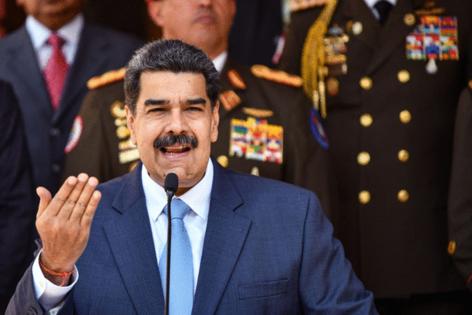Will Biden reimpose sanctions on Venezuela? US presidential election muddles decision
Published in News & Features
The United States may decide this week whether to reimpose oil sanctions on Venezuela after strongman Nicolás Maduro violated the terms of an agreement signed in Barbados last year to let opposition candidates run in upcoming presidential elections.
But U.S. domestic politics are complicating the decision.
The Biden administration gave Maduro six months, which are up Thursday, to show he would honor the deal, which was negotiated with support from the United States. However, U.S. officials are struggling to make a decision because they are concerned that immigration and domestic oil prices could be affected as the U.S. heads toward the presidential election in November.
Sources with knowledge of administration discussions said there are ongoing debates among U.S. officials. Some support reimposing sanctions, others are concerned that the impact of sanctions on the South American country’s economy might drive more migration to the U.S., and still others worry about rising oil prices during an election year.
“Domestic context in the United States is critically important,” said Eric Farnsworth, vice president of the Americas Society and Council of the Americas. “You have an election year and concerns about increasing gas prices and migration issues, which are very relevant in the context of Venezuela policy. But we shouldn’t be in this position in the first place because we lifted sanctions prematurely, based on promises that really were never going to be kept by the Venezuelan regime.”
Venezuela, which sits on the largest oil reserves in the world, has been a headache for Republican and Democratic administrations alike as Maduro and his allies have pushed the once-rich country into a spiraling humanitarian crisis, causing the largest migration in the Western Hemisphere’s recent history.
The Trump administration openly sought regime change through a “maximum pressure campaign,” imposing sanctions in 2017 on Venezuelan oil and the regime’s top leaders. The Biden administration has used that leverage to entice Maduro to sit down with the opposition to negotiate a path to free and fair elections despite widespread skepticism.
Those fears have fully materialized, and pressure to reimpose the oil sanctions is mounting.
Maduro banned popular opposition candidate Maria Corina Machado from running for president after she got more than 92% of the vote during the opposition primaries in October. He has also moved to block other picks by the opposition’s main political alliance, the Unitary Platform, so he can control who runs — all in violation of the agreement signed in Barbados in October with the opposition and the blessings of the U.S.
Maduro is scheduled to run for president again in the election on July 28, competing only against a small number of little-known opponents. Despite Maduro having a popularity of only 9%, according to polls, regime insiders believe he can easily win, given that the opposition’s vote would be split between the other contenders.
...continued
©2024 Miami Herald. Visit miamiherald.com. Distributed by Tribune Content Agency, LLC.







Comments